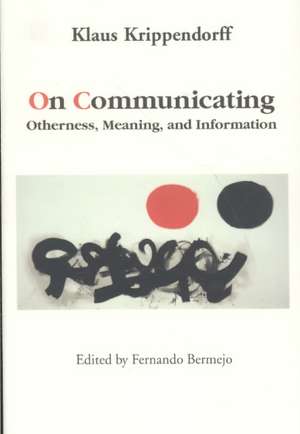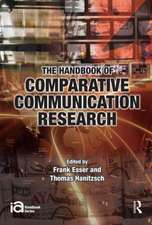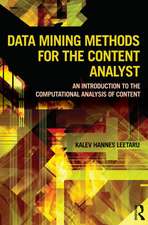On Communicating: Otherness, Meaning, and Information
Autor Klaus Krippendorff Editat de Fernando Bermejoen Limba Engleză Paperback – 28 aug 2008
| Toate formatele și edițiile | Preț | Express |
|---|---|---|
| Paperback (1) | 392.28 lei 6-8 săpt. | |
| Taylor & Francis – 28 aug 2008 | 392.28 lei 6-8 săpt. | |
| Hardback (1) | 1061.06 lei 6-8 săpt. | |
| Taylor & Francis – 26 aug 2008 | 1061.06 lei 6-8 săpt. |
Preț: 392.28 lei
Nou
Puncte Express: 588
Preț estimativ în valută:
75.09€ • 81.59$ • 63.11£
75.09€ • 81.59$ • 63.11£
Carte tipărită la comandă
Livrare economică 21 aprilie-05 mai
Preluare comenzi: 021 569.72.76
Specificații
ISBN-13: 9780415978606
ISBN-10: 0415978602
Pagini: 384
Ilustrații: 4 tables and 22 line art images need to be redrawn
Dimensiuni: 152 x 229 x 20 mm
Greutate: 0.52 kg
Ediția:1
Editura: Taylor & Francis
Colecția Routledge
Locul publicării:Oxford, United Kingdom
ISBN-10: 0415978602
Pagini: 384
Ilustrații: 4 tables and 22 line art images need to be redrawn
Dimensiuni: 152 x 229 x 20 mm
Greutate: 0.52 kg
Ediția:1
Editura: Taylor & Francis
Colecția Routledge
Locul publicării:Oxford, United Kingdom
Cuprins
Introduction
Part 1: Communicating
Chapter 1. An Alternative Paradigm
Chapter 2. Epistemological Grounding
Chapter 3. Major Communication Metaphors
Chapter 4. A Recursive Framework for Communication Theories
Chapter 5. Conversation or Intellectual Imperialism
Part 2: Otherness
Chapter 6. The Otherness that Theory Creates
Chapter 7. A Cybernetics of I-Other Relations
Chapter 8. Pathology, Power and Emancipation
Chapter 9. Writing Ecologically
Part 3: Meaning
Chapter 10. A Constructivist Critique of Semiotics
Chapter 11. The Dialogical Meaning of Cultural Artifacts
Chapter 12. The Methodo-logic of Content Analysis
Chapter 13. Discourse as Systematically Constrained Conversation
Part 4: Information
Chapter 14. An Introduction to Information Theory
Chapter 15. Research In-Formation
Chapter 16. Paradox and Information
Chapter 17. Cyberspace and its Artifacts
Chapter 18. Social Memory
References
Part 1: Communicating
Chapter 1. An Alternative Paradigm
Chapter 2. Epistemological Grounding
Chapter 3. Major Communication Metaphors
Chapter 4. A Recursive Framework for Communication Theories
Chapter 5. Conversation or Intellectual Imperialism
Part 2: Otherness
Chapter 6. The Otherness that Theory Creates
Chapter 7. A Cybernetics of I-Other Relations
Chapter 8. Pathology, Power and Emancipation
Chapter 9. Writing Ecologically
Part 3: Meaning
Chapter 10. A Constructivist Critique of Semiotics
Chapter 11. The Dialogical Meaning of Cultural Artifacts
Chapter 12. The Methodo-logic of Content Analysis
Chapter 13. Discourse as Systematically Constrained Conversation
Part 4: Information
Chapter 14. An Introduction to Information Theory
Chapter 15. Research In-Formation
Chapter 16. Paradox and Information
Chapter 17. Cyberspace and its Artifacts
Chapter 18. Social Memory
References
Notă biografică
Klaus Krippendorff is Gregory Bateson Term Professor for Cybernetics, Language, and Culture in the Annenberg School for Communication at the University of Pennsylvania. His landmark book Content Analysis, now in its second edition, has been translated into Hungarian, Japanese, Italian, and Spanish.
Fernando Bermejo teaches Communication at the Universidad Rey Juan Carlos in Madrid, Spain. He holds a Ph.D. from the Universitat Autónoma de Barcelona and an MA from the Annenberg School for Communication at the University of Pennsylvania.
Fernando Bermejo teaches Communication at the Universidad Rey Juan Carlos in Madrid, Spain. He holds a Ph.D. from the Universitat Autónoma de Barcelona and an MA from the Annenberg School for Communication at the University of Pennsylvania.
Descriere
Klaus Krippendorff is an influential figure in communication studies widely known for his award-winning book Content Analysis. Over the years, Krippendorff has made important contributions to the ongoing debates on fundamental issues concerning communication theory, epistemology, methods of research, critical scholarship, second-order cybernetics, the social construction of reality through language, design, and meaning. On Communicating assembles Krippendorff’s most significant writings – many of which are virtually unavailable today, appearing in less accessible publications, conference proceedings, out-of-print book chapters, and articles in journals outside the communication field. In their totality, they provide a goldmine for communication students and scholars. Edited and with an introduction by Fernando Bermejo, this book provides readers with access to Krippendorff’s key works.














